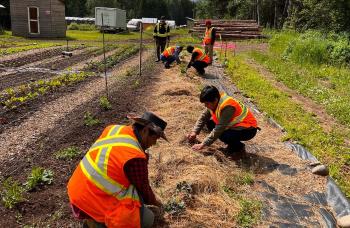Image Caption
Local Journalism Initiative Reporter
Windspeaker.com
Thanks to a $1 million grant, construction on a new Indigenous-led food hub and training centre is expected to begin in northern British Columbia this summer.
The 4,000 sq. ft facility, which will consist of a longhouse, will be at the Tea Creek farm, located in the community of Kitwanga. Tea Creek is operated by the Indigenous Food Sovereignty Association, a non-profit society founded in 2022.
Earlier this month it was announced Tea Creek would receive the United Way British Columbia’s Large Food Infrastructure Grant. Funding for the grant is provided in partnership with the Government of British Columbia through its Ministry of Social Development & Poverty Reduction.
“I’m very, very grateful,” said Jacob Beaton, who is Tsimshian and the co-owner of the family-owned Tea Creek farm. “I'm very happy with United Way. They've been very good, very authentic supporters. They've supported us now for the last few years. We've actually gotten some smaller grants from them that have helped us with food production here.”
Beaton said he had applied for the latest United Way grant about a year ago and was notified this past October funding was forthcoming.
“We weren't allowed to talk about it until they had all their ducks in a row and made the public announcement,” Beaton said. “We knew it was coming, which is really good because building something of this scale, you can't do it overnight. You need as much time as possible to do all the planning and procurement and get it ready to build. And then we have to actually build it. So, it’s quite an undertaking.”
Beaton expects construction of the longhouse at Tea Creek to begin in July.
“The major construction is going to be three months and then probably another couple of months to put in all the doors and windows and lights and light switches,” he said.
Tea Creek officials have applied for numerous other grants, Beaton said. Building the longhouse is just a first step in what they are hoping their facility eventually looks like.
“Our vision is much bigger than that,” he said, adding Tea Creek is hoping to raise $7.5 million to fulfill its goals. “The original plan is for two longhouses, connected at the back with a big food processing facility. We realize it was too hard to try and raise that amount of money. So, we scaled it back to just one longhouse.”
Beaton said the budget for the first longhouse is $2.5 million. And that’s why despite the United Way grant, fundraising efforts are continuing in earnest.
“The $1 million from United Way doesn't get us things like get a commercial kitchen,” he said. “And it doesn't put the other pieces in that we're hoping to get in there. But it's a good start.”
Beaton said phase one of the longhouse will include a roofed building and lighting.
“It’ll be great. We’ll be able to do a lot with it. I want to be very clear. We can do a lot with $1 million.”
Tea Creek has been bustling in recent times.
“Last year at the community harvest 400 people came and in two days harvested over 10,000 pounds of food,” Beaton said. “And there was nowhere to bring the food. We didn't have a building to take that food into and then process it together. So, what this longhouse is going to do, it's going to give us much needed roof space as a starting point where we can go and process food together. We can be under a shelter.”
The new longhouse facility will enable Tea Creek to offer workshops on food sovereignty, preservation and economic empowerment.
The centre will also strengthen area food systems by providing food storage and training for communities to establish economic opportunities in entrepreneurship and food production.
Beaton said he has bigger plans for Tea Creek.
“The goal for us back when I started budgeting for what our vision is here was to get to $116 million to build Tea Creek as basically a full post-secondary institution where you can come here from any First Nation across the country to learn and get your master's degree in Indigenous food sovereignty,” he said.
“It's a place currently where people come to learn. And we would just like to have the facilities and the programs to do that long term, so people come here not just for a day or a few weeks. But they're able to come here for years and really get fully trained, kind of competent in all of the skills you need in order to lead a project like this in your own territory.”
Local Journalism Initiative Reporters are supported by a financial contribution made by the Government of Canada.

